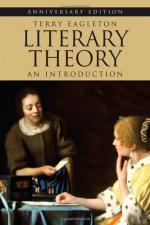
|
| Name: _________________________ | Period: ___________________ |
This quiz consists of 5 multiple choice and 5 short answer questions through Chapter 5, Psychoanalysis.
Multiple Choice Questions
1. Eagleton argues that a literary work in Romantic society becomes what rather than rational and mechanical?
(a) Spontaneous.
(b) Progressive.
(c) Ideological.
(d) Interesting.
2. According to Eagleton, why did intellectuals preoccupy themselves with language in the late-nineteenth and twentieth centuries?
(a) Because discourse had become elevated by intellectuals.
(b) Because discourse had become an instrument of opposition in academia.
(c) Because discourse had become irrelevant in industrial society.
(d) Because discourse had become degraded to an instrument of industrial capitalism.
3. By the early 1930s, the study of English literature became what kind of pursuit?
(a) A supremely civilizing pursuit.
(b) A singular narrowminded pursuit.
(c) A singular openminded pursuit.
(d) A supremel uncivilized pursuit.
4. For Eagleton, Gadamer's theory only holds if one makes what "enormous assumption"?
(a) That there is a single, mainstream modernity.
(b) That there is a single, mainstream tradition.
(c) That there are multiple traditions.
(d) That there are multiple modernities.
5. What year did Terry Eagleton's "Literary Theory: An Introduction" first appear?
(a) 1993.
(b) 1983.
(c) 1943.
(d) 1963.
Short Answer Questions
1. According to Eagleton, what happens when literary theory becomes "turgidly unreadable"?
2. Eagleton argues that the readership his book has attracted dispels the notion that literary theory is what?
3. According to Eagleton, what kind of age do we live in, where "meaning, like everything else, is expected to be instantly consumable"?
4. According to Eagleton, structuralism has proved that there is nothing _____ about codes.
5. The German philosopher Edmund Husserl argued that objects can be regarded as things ______ by consciousness.
|
This section contains 278 words (approx. 1 page at 300 words per page) |

|




